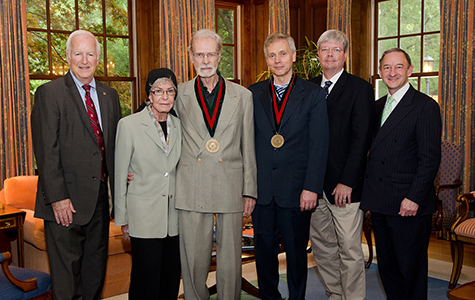
Marco Colonna, MD, has been named the Robert Rock Belliveau, MD, Professor of Pathology at Washington University School of Medicine in St. Louis.
Chancellor Mark S. Wrighton and Larry J. Shapiro, MD, executive vice chancellor for medical affairs and dean of the School of Medicine, announced the appointment.
“Dr. Colonna’s studies of the specialized cells of the immune system provide important knowledge about how the body responds to infection,” Wrighton said. “Through the generosity of Dr. Belliveau and his wife, Rita, this new professorship will allow us to improve human health through Dr. Colonna’s research findings.”
“In an era of increasing microbial resistance to treatment, Marco Colonna’s work is providing scientists with insights that may one day help us maximize the effectiveness of our own natural defenses,” Shapiro said. “His research is also helping us understand the origins of autoimmune diseases, which result from immune attacks on healthy tissues.”
Colonna was installed as the Robert Rock Belliveau, MD, Professor of Pathology on May 30.
“I am truly excited and honored to receive this prestigious professorship,” Colonna said. “It is an important recognition for the work that my research team has conducted in the field of innate immunity against infections and tumors. It will give us new impetus in further advancing research that will impact many human diseases.”
Colonna’s research focuses on the innate immune system, the branch of our immune defenses that responds more rapidly to threats. His discoveries have included the identification of receptors that allow immune cells known as natural killer cells to discriminate between normal and tumor cells, and to selectively kill tumor cells.
Colonna also discovered that an immune cell known as the human plasmacytoid dendritic cell is a major source of inflammatory compounds essential for battling viral infections. He was the first researcher to discover a rare type of immune cell in the human gut that significantly improves the intestine’s ability to fight bacterial infections.
Further, he identified a receptor that lets cells in the brain fight neuronal degeneration and dementia.
“Marco Colonna’s contributions to immunology are wide-ranging and seminal,” said Herbert W. Virgin IV, MD, PhD, the Edward Mallinckrodt Professor and head of the Department of Pathology and Immunology. “He is a true ‘scientist’s scientist,’ who is one of the most insightful people I know, and he has that special sense of what is truly important that sets the very best scientists apart.”
Belliveau graduated from the School of Medicine in 1957. He completed an internship in pathology at Barnes Hospital (now Barnes-Jewish Hospital) and residency training in pathology at the University of California hospitals in San Francisco. He practiced pathology in Las Vegas until his retirement in 2000.
Belliveau and his wife, Rita Deanin Abbey, emeritus professor of art at the University of Nevada, Las Vegas, are generous supporters of Washington University. In addition to the new professorship and other gifts to the School of Medicine, they support an award for a graduate student in painting and sculpting in the College and Graduate School of Art in the Sam Fox School of Design and Visual Arts.
Washington University School of Medicine’s 2,100 employed and volunteer faculty physicians also are the medical staff of Barnes-Jewish and St. Louis Children’s hospitals. The School of Medicine is one of the leading medical research, teaching and patient care institutions in the nation, currently ranked sixth in the nation by U.S. News & World Report. Through its affiliations with Barnes-Jewish and St. Louis Children’s hospitals, the School of Medicine is linked to BJC HealthCare.